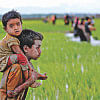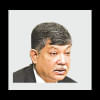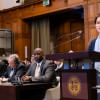Rohingyas 'terrified' about leaving
A plan to start repatriating Rohingyas back to Myanmar is premature and the refugees are "terrified" about leaving Bangladesh where they sought refuge, dozens of aid agencies working in the region said yesterday.
More than 720,000 Rohingyas fled Myanmar's northern Rakhine state after a heavy-handed army crackdown in August last year that survivors say involved mass rape and extrajudicial killings.
UN officials say the country's military leaders should be investigated for genocide but Myanmar has rebuffed the calls, arguing it was only defending itself against Rohingya militants who attacked police posts.
Both Bangladesh and Myanmar signed a repatriation agreement in November last year to allow Rohingyas to return but many fear going back without guarantees of citizenship, freedom of movement and safety.
However the governments confirmed in recent weeks that they were pushing ahead with the first large-scale repatriation set for mid-November, prompting an outcry from activists who say conditions on the ground in Rakhine are not adequate to take the refugees back.
"They are terrified about what will happen to them if they are returned to Myanmar now, and distressed by the lack of information they have received," the group of 42 aid agencies and civil society groups said in a statement that referred to the push as "dangerous."
"They fled to Bangladesh to seek safety and they are very grateful to the Government of Bangladesh for giving them a safe haven."
Oxfam, World Vision and Save the Children were among the groups working in Myanmar and Bangladesh that signed the statement.
They said refugees fear living in enclosed settlements like the one in central Rakhine state, where more than 120,000 Rohingyas have been confined to camps for six years since inter-communal violence erupted in the region in 2012.
Myint Khaing, the Maungdaw township administrator in northern Rakhine, told AFP that November 15 is the estimated repatriation start date and that the plan is to receive more than 2,200 people in total at a rate of 150 per day.
But he seemed unsure if it would go ahead.
"We can confirm only on the 15th whether the people from our given list are coming or not," he said.
Northern Rakhine has been largely sealed off since the crackdown except for tightly organised government trips for media and senior visiting diplomats.
The UN has been granted access to the area to assess conditions on the ground but the approvals have been slow and the amount of territory accessible has been limited.
Authorities in Bangladesh worry that Rohingya may once again risk travelling to other parts of Southeast Asia by boat, a route previously popular with those seeking economic opportunities outside the grim camps.
This week Bangladesh's coast guard rescued 33 Rohingyas and detained six alleged human traffickers from a fishing trawler headed for Malaysia in the Bay of Bengal.

 For all latest news, follow The Daily Star's Google News channel.
For all latest news, follow The Daily Star's Google News channel. 








Comments